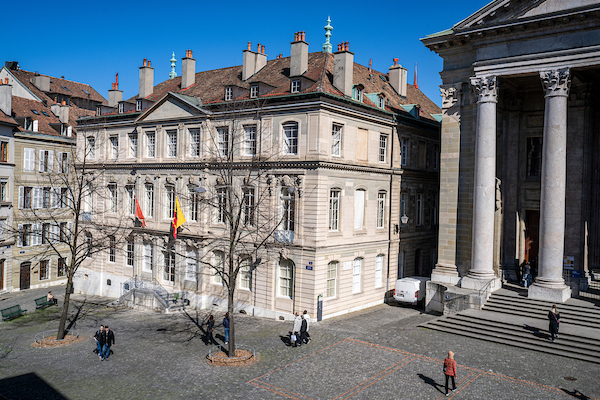
Housed in an elegant townhouse in Geneva’s Old Town, the International Museum of the Reformation traces the history of the Protestant Reformation across nine rooms, from the 16th century to today. Paintings, manuscripts, objects, and interactive displays explore the movement’s impact in Geneva and beyond. From Calvin to Martin Luther King, the permanent exhibition offers both chronological and thematic paths, with augmented reality features and audio guides available in ten languages.
Lucy Lagier, specialist in early modern history and author of a bachelor’s thesis on ceremonial display and royal image in the sixteenth century, will begin a Master’s in General History at the University of Neuchâtel.
This lecture examines the politics of appearance around Elizabeth I, exploring how clothing and jewellery signalled social rank and inner identity. It investigates the influence of Protestant norms on her aesthetic choices and considers whether crafted imagery contributed to the acquisition and preservation of monarchical power.
In French.
Argentine singer-guitarist Mariana Juarez leads a programme of nueva canción, joined by accordionist Eugénie Gallay and violinist Pamela Hekimian. The set traces the movement’s blend of folk melodies and pointed political lyricism, exploring poverty, human rights and resistance to dictatorship. Framed by the MIR’s pedagogical tour MIR au féminin and the memory of figures like Marie Dentière, the performance favours intimate textures, raw vocal expression and poignant storytelling, transporting listeners into a charged, communal space.
Nicolas Thiry, MA (University of Geneva), specializes in the early phase of the Wars of Religion with a focus on Béarn and Navarre in the sixteenth century. He teaches secondary school and works as a cultural mediator.
This lecture examines Jean Morély’s challenge to Calvinist discipline, exploring his advocacy for more democratic church governance and active lay participation. It investigates why Jeanne d’Albret granted him a platform and how his ideas threatened to split the French-speaking Reformation, revealing tensions between authority and popular religious practice.
In French.
Judith Roche is a PhD candidate at the Institute of the History of the Reformation, specialising in late sixteenth-century religious history. Her Master’s thesis studied confessional controversies through the cooking-pot motif.
The lecture examines how polemical works used the cooking pot as a charged symbol—ranging from infernal instrument to emblem of communal difference—to fuel Manichaean narratives and exacerbate Catholic–Protestant tensions. Roche explores the visual and rhetorical strategies that shaped confessional identities in sixteenth-century France.
In French.
Eliott Henchoz, MA student in General History at the University of Geneva, specializes in early modern Alpine history and Reformed humanist texts. His research includes sixteenth-century representations of the Western Alps.
This lecture examines the sixteenth-century shift from demonic to revelatory perceptions of Alpine space, exploring how believers materialized God’s presence in mountains. It investigates contrasts between Catholic and Reformed expressions, analysing textual and cultural practices that revealed different theological strategies for asserting divine presence in alpine landscapes.
In French.
Event removed from your CoolAgenda.
Your password has been reset successfully. You can now log in with your new password.
We’ve sent you a password reset email to the address provided. Please check your inbox and/or spam folder.
Please check your inbox for a verification email to complete your sign-up.